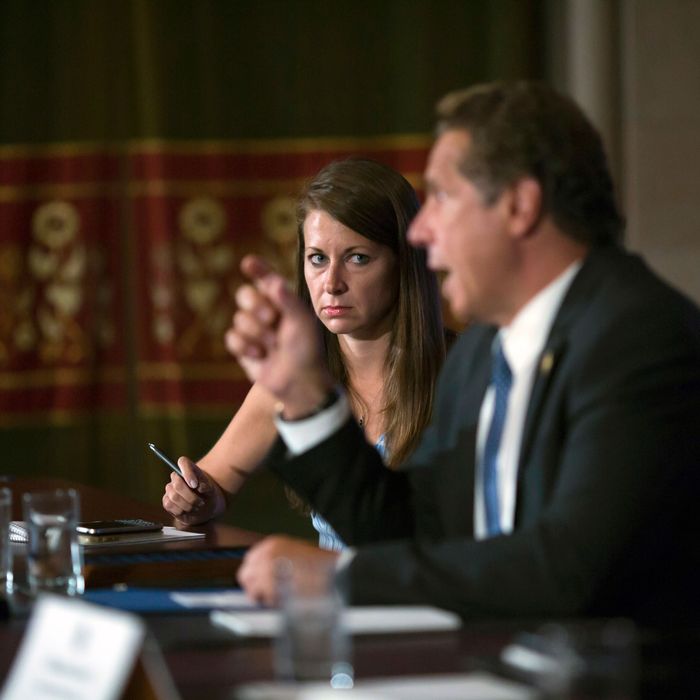
Surviving in Andrew Cuomo’s orbit always required more than competence. Policy vision, ambition, and hustle would only get you so far. Young, hungry staffers are expendable, as are those who come from good schools and answer emails in a timely fashion.
To make it in Cuomoland, above all else, you need to be loyal. To the man, to the brand, the power that pulsed out of the capital and cowed legislators, county executives, and mayors alike. As the meat of the damning 168-page attorney general’s report into Cuomo’s sexual harassment made its way Tuesday through the political world and beyond, it became clear that a select number of aides had been, as long suspected, remarkable enablers of Cuomo’s predatory behavior.
There was Alphonso David, Cuomo’s former counsel, forwarding along confidential personnel records of Lindsey Boylan, a former aide who had accused Cuomo of forcibly kissing her. There was Cuomo’s senior adviser and pugnacious press secretary, Richard Azzopardi, who then sent them to newspaper reporters in a brazen attempt to smear Boylan in the press. There, too, was the former subject of a glowing Harper’s Bazaar cover, Melissa DeRosa, in batches of email communications, plotting a way forward for her beleaguered boss. Spin is “full-throated emotional apology,” DeRosa wrote on March 3, the day Cuomo delivered a video where he seemed to hold back tears, apologizing for making his accusers feel uncomfortable.
At every turn, DeRosa and her colleagues enabled Cuomo’s predation. “Over the course of our investigation, most witnesses not in the Governor’s inner circle provided a consistent narrative as to the office culture of the Executive Chamber, describing it as ‘toxic’ and full of bullying-type behavior, where unflinching loyalty to the Governor and his senior staff was highly valued,” the report read. “Several State employees, including those outside of the Executive Chamber, told us that they believed their careers in New York State government would be over if they were to cross the Governor or senior staff, including by reporting any misconduct.”
There would be no Cuomo — to this degree, at least — without his inner circle. Larry Schwartz, a political operative who is useful to Cuomo because he will perpetually follow an order, was overseeing vaccine distribution in the state, though he has no background in science, medicine, or public health. Schwartz, in his capacity as vaccine czar, pressed at least two county executives on their loyalty to Cuomo as the governor was first facing scrutiny for allegedly sexually harassing a wide range of current and former staffers, as well as other women. Schwartz’s behavior was disturbing, of course, but also expected — what else would a man with no public-health expertise do other than talk politics and make threats? How else could this go?
With few exceptions, those closest to Cuomo were imbued with his darkest impulses, prone to screaming fits that disturbed legislators, reporters, and anyone who came into close contact with his government. Cuomo press aides, in the glory days of the governor, berated journalists regularly. Lower-level aides endured a similar degree of wrath. Cuomo was a fickle king, and those who wanted to remain in the court had to discard decorum and empathy.
DeRosa once told a state senator, Alessandra Biaggi, that she was a “bad person” and “full of shit.” Before DeRosa filled the role as Cuomo’s enforcer, there was Joe Percoco, once regarded by Cuomo as someone akin to a brother. Percoco would end up in prison, quarterbacking an egregious corruption scheme out of Cuomo’s government. Prosecutors could never implicate Cuomo himself.
Working for Cuomo while attempting independent thought was, in the long run, not really possible. The most glaring example was Andy Byford, a well-regarded transportation expert who was recruited to rescue New York’s failing subway system. Byford found success, proposing a far-reaching plan to overhaul an 80-year-old signal network. But he was popular with the press and too willing to argue his position to Cuomo, who constantly meddled in his work. Byford’s position became untenable and he quit, shortly before the pandemic, moving back to his native England.
For New Yorkers, that was the ultimate tragedy: Loyalty always outstripped competence. The state government was never particularly well-run. The Cuomo-controlled MTA wasted enormous amounts of money. Quid pro quo corruption schemes of the like that Percoco oversaw marred economic-development initiatives. Democracy itself faltered, as the patronage-ridden Board of Elections failed in election after election, with Cuomo shrugging from the sidelines.
In the coming days and months, as Cuomo faces down a legislature that has probably rounded up the votes to remove him from office, beware the acolytes and sycophants who beg for rehabilitation. David, Cuomo’s ex-counsel, is attempting a makeover already, calling for his old boss’s resignation. The irony is dizzying: Imagine, for a moment, an aghast Rudy Giuliani demanding that Donald Trump no longer seek elected office.
DeRosa, Azzopardi, and the rest have not made such moves yet. Their allegiance to Cuomo runs deep and they will be hard-pressed to flee. But all will seek, at some point, a post-Cuomo future and they will try to justify to themselves and to others why they remained there so long, propping up a governor like Cuomo. Some may try to rebrand or claim, against all evidence, they opposed the worst instincts of their leader. They will hunt for generous private-sector sinecures; given the realities of our unseemly political world, they will probably find them. What they should never receive, though, is the mercy and understanding they never afforded others. Cuomo will leave office in disgrace. They deserve his fate.
More on Andrew Cuomo
- The Heavy Hitters Who Could Run to Succeed Eric Adams
- Eric Adams’s Strategy to Hang On
- Andrew Cuomo Wants the Kind of Redemption That Comes From Winning an Election





























